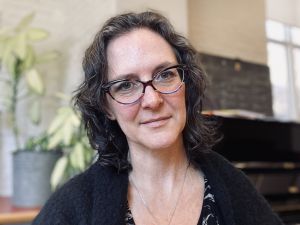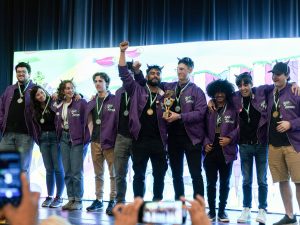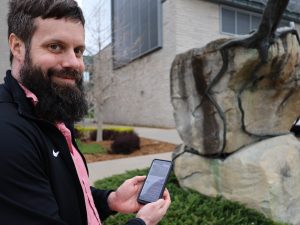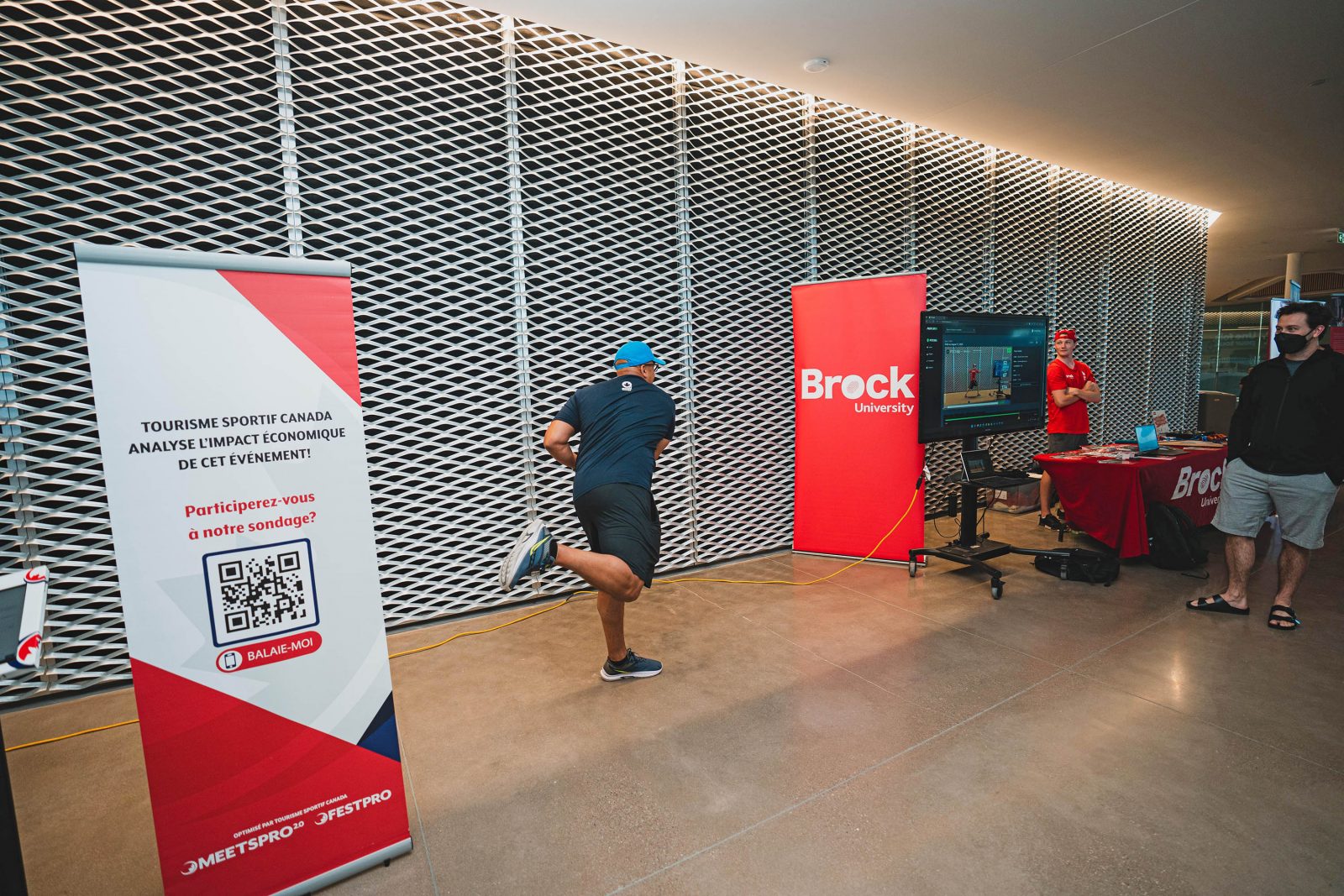 Brock University Associate Professor of Kinesiology Michael Holmes (far right), Canada Research Chair in Neuromuscular Mechanics and Ergonomics, held a motion capture system demonstration during the Niagara 2022 Canada Summer Games.
Brock University Associate Professor of Kinesiology Michael Holmes (far right), Canada Research Chair in Neuromuscular Mechanics and Ergonomics, held a motion capture system demonstration during the Niagara 2022 Canada Summer Games.When the decision was made for Niagara to host the Canada Summer Games and for Brock University to be a key partner, Tim Kenyon and Julie Stevens spotted a golden opportunity.
Kenyon, Brock’s Vice-President, Research, and Stevens, Special Advisor to the President — Canada Games, were among a group of people that envisioned the bold possibilities — including a wealth of research opportunities — that a Brock-Canada Games partnership could bring to benefit the University, region and country.
Years of hard work and collective effort later, the Niagara 2022 Canada Summer Games will go down in history as being the first “research Games,” Kenyon said.
“The idea of a ‘research Games’ grew out of a conviction shared by many colleagues, including then-President Gervan Fearon, that the Canada Summer Games was going to be an extremely important moment for Brock and for Niagara,” he recalled. “I believe the deliberateness and the depth of Brock’s scholarly and experiential engagement with the Canada Games, from research projects to teaching and learning initiatives, are novel developments in the history of the Games.”
As Special Advisor, Stevens heads up the academic side of the Canada Games, overseeing three sub-committees: research, curricular and community engagement.
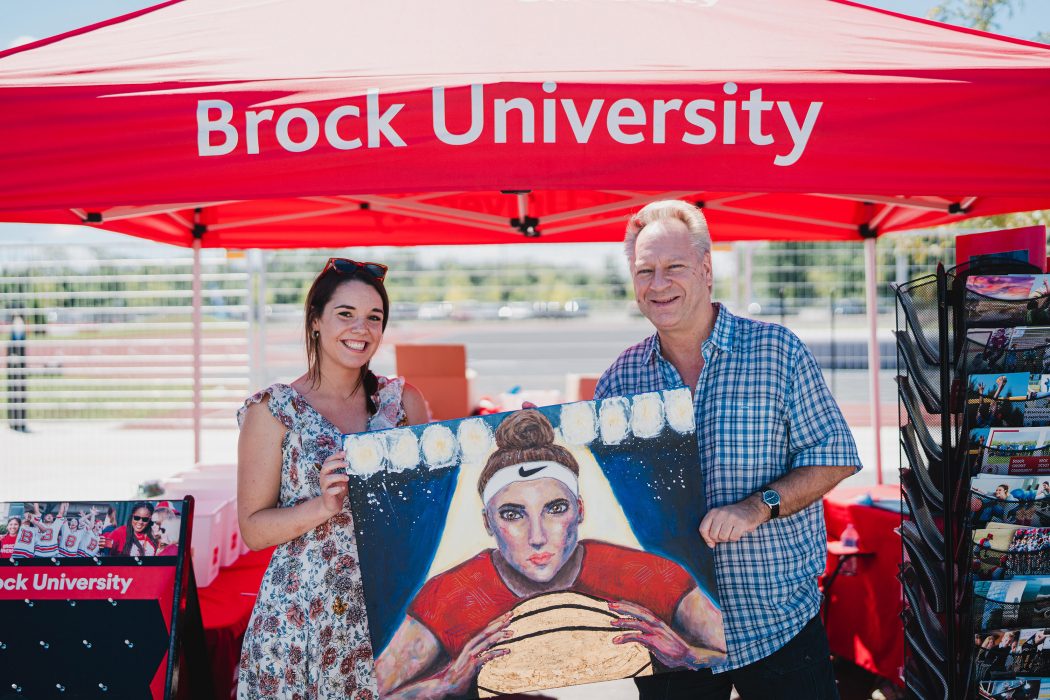
Peter Vietgen (right), Associate Professor of Visual Arts Education in Brock University’s Teacher Education program, and Master of Education student Becca Marshall showcase some of the artwork created as part of a community art project Vietgen led with the support of a VPR Canada Games Research Grant. The painting on display, shown at Niagara Place during the Canada Summer Games, was created by a student from Eden High School in St. Catharines.
“We have identified specific goals and secured project funding to expand curricular and academic program development, initiate new research projects and foster enhanced community partnerships,” she said as planning was underway.
Stevens, Kenyon and others recognized that the Canada Games is not just a sport competition, but an event that is shaped by, and has impacts on, the economic, political, cultural and social life of the host community and beyond.
“The Games is a phenomenon that connects to multiple disciplines, such as art, culture, communication, marketing and sport,” Stevens said.
Such a holistic view opens up many possibilities for researchers and community members to collect data in a wide variety of areas.
These data can be used for research examining everything from community development to sport analytics to the development of artistic expression to recommendations for future Games.
“The Games are an invitation to research, scholarship, creativity and innovation in absolutely every discipline,” Kenyon said.
To encourage Brock researchers from across campus to pursue research exploring the many dimensions of the Canada Games, Kenyon created the VPR Canada Games Research Grants program.
Established in 2019, the program supported Brock researchers and scholars in all departments and Faculties with grants of up to $7,000 to undertake research or a creative activity in any discipline and on any topic that relates to the Canada Games.
Over the program’s three years, 28 researchers from six Brock Faculties received funding for 30 research projects totalling more than $198,000, with some outcomes already being realized (see accompanying infographic and list of research programs).
Kenyon said research arising out of the VPR Canada Games Research Grants program has “exceeded my most optimistic expectations,” noting their “creativity, impacts and the way so many of them include research mentorship and student research opportunities.”
“The knowledge and insights created by these projects will be felt in many fields and in the legacy of the Games themselves for many years to come, just as the experience of conducting them will inform the lives of students and the next generation of researchers,” he said.
Kenyon credited the Research Sub-Committee and the Office of Research Services for publicizing and facilitating the program and encouraging researchers to apply for the grant.
The 11-member sub-committee, headed by the Head of Library Systems and Technology Jonathan Younker, examines the ways faculty and students can leverage the Games for research purposes, and, in turn, provide Canada Games organizers with data that will help them in the future.
“Under Dr. Stevens’ leadership, the sub-committee was instrumental in structuring the grant: brainstorming what it looked like, the timing of announcements, the proposed grant amounts, the Research Showcase schedule and other details,” Younker said.
The sub-committee has scheduled a Canada Games Research Showcase, to be held Oct. 6, at which researchers are expected to present their projects’ preliminary or final results. More details on the event will be released in the near future.
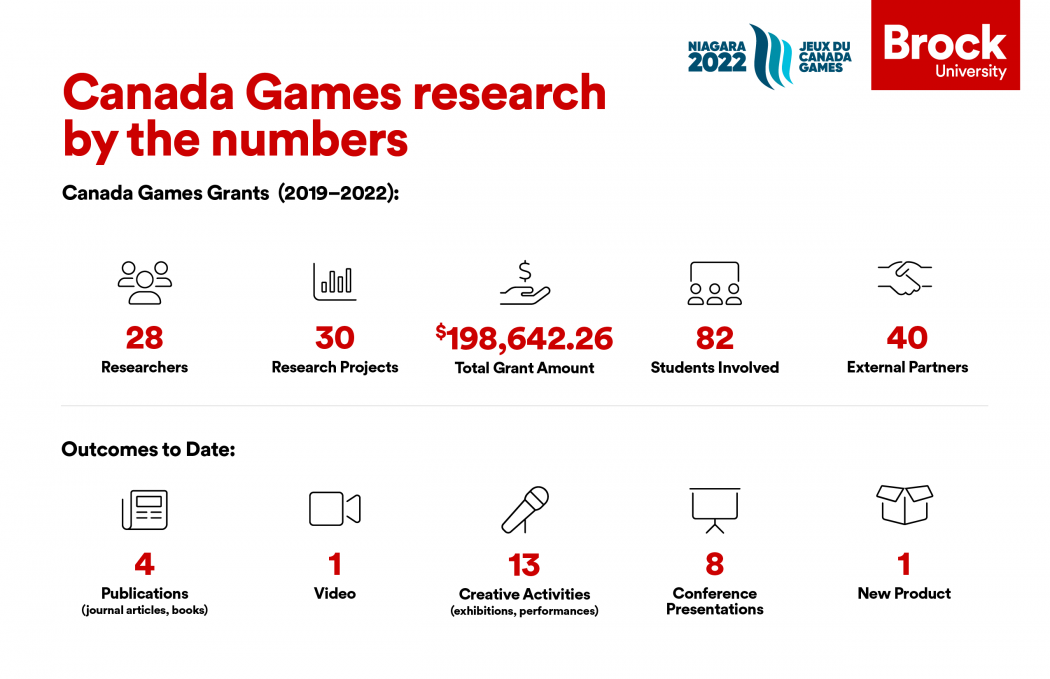
VPR Canada Games Research Grants program recipients
2019-2020
- Poling Bork, Faculty of Mathematics and Science, “Canada Games Athlete Village software application (AV app)”
- Nicole Chimera, Faculty of Applied Health Sciences, “Injuries and Illnesses across 10 years of Canada Games Competitions: 2009-2019”
- Michele Kathryn Donnelly, Faculty of Applied Health Sciences, “Gender Equality at the Canada Games: A Historical Perspective”
- Karen Fricker, Faculty of Humanities, “Circus on the Canal: Exploring the connections between water sports and circus performance”
- Amy Friend, Faculty of Humanities, “Movements Across the Waterways”
- Michael Holmes, Faculty of Applied Health Sciences, “Development of an objective video-based athlete assessment tool for performance optimization and injury prevention”
- Nicole Luke, Faculty of Social Sciences, “Understanding the Impact of Participation in the Canada Games on Individual Ontario Athletes”
- William Marshall, Faculty of Mathematics and Science, “Using Data Science to Predict Golfer Performance”
- Catherine Parayre, Faculty of Humanities, “Brock project Lacrosse (Small Walker Press)”
- Brian Roy, Faculty of Applied Health Sciences, “Sport Injuries during the Canada Games: Informing a standardized prospective injury surveillance system”
- Jonathan Younker, Brock University Library, “Canada Games Research Collection/Support & Digital Storytelling Initiative”
2020-21
- Abdul Ashraf, Goodman School of Business, “Reaching and Engaging Canada Games Fans with Augmented Reality”
- Karen Fricker, Faculty of Humanities, “Circus on the Canal: Exploring connections between water sports, circus and spectators”
- Asif Khowaja, Faculty of Applied Health Sciences, “The Economic Burden of Injuries Across 10 years of Canada Games Competitions, 2009-2019”
- Duncan Koerber, Faculty of Social Sciences, “Social Media and Large Sporting Events: Social Media Crisis Monitoring of the Niagara 2022 Canada Games”
- Jae Patterson, Faculty of Applied Health Sciences, “Developing Athletic Expertise Based on Motor Learning Practice Structures”
- Kyle Rich, Faculty of Applied Health Sciences, “Municipal collaboration in regional event hosting processes: The case of Niagara 2022”
- Valdeep Saini, Faculty of Social Sciences, “Translating Behavioural Momentum to Athlete Performance”
- Philip Sullivan, Faculty of Applied Health Sciences, “Mental toughness and injury rehabilitation behaviours in elite youth sport in Canada”
- Donna Szoke, Faculty of Humanities, “Painted Turtles”
- Peter Vietgen, Faculty of Education, “PARTicipation Niagara 2022: A Celebration of Sports & Art through the Eyes of Niagara’s Young Artists”
- Elizabeth Vlossak, Faculty of Humanities, “Digitizing the photographic legacy of the Canada Games”
2021-22
- Corliss Bean, Faculty of Applied Health Sciences: “Exploring Female Sport Leaders’ Journeys to the Canada Games Using Digital Storytelling”
- Nicole Chimera, Faculty of Applied Health Sciences: “Impact of COVID-19 Pandemic on Injuries and Illnesses in Canada Games Competitions”
- Kim Gammage, Faculty of Applied Health Sciences: “Focusing on the positives: A test of the embodiment model of positive body image in elite athletes”
- Adam Kanar, Goodman School of Business: “Competency Awareness and Articulation in 2022 Canada Games Volunteers”
- Nota Klentrou, Faculty of Applied Health Sciences: “Dietary energy intake, energy balance, nutrition knowledge and supplement use among youth athletes participating in the 2022 Canada Games”
- Yifeng Li, Faculty of Mathematics and Science: “Sport AI Enabled by Multi-Agent Deep Reinforcement Learning Approaches”
- Diane Mack, Faculty of Applied Health Sciences: “Prioritizing Mental Health: An Investigation of Canadian Olympic Sport Organizations”
- Dawn Trussell, Faculty of Applied Health Sciences: “Where’s Mom? Investigating the Intersection of Motherhood and the Under-representation of Women in Coaching through a Major Games Event”


